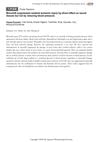 July 2015 in “Cambridge University Press eBooks”
July 2015 in “Cambridge University Press eBooks” Androgens like testosterone affect skin health and can lead to conditions such as acne and hair loss, with various treatments available.
 January 2012 in “Elsevier eBooks”
January 2012 in “Elsevier eBooks” New treatments for skin and hair repair show promise, but further improvements are needed.

Treatments for hair loss vary, but cell-based options may be the future.
 5 citations,
December 2022 in “Toxins”
5 citations,
December 2022 in “Toxins” Neurotoxins can affect neurotransmitter release and have potential in treating muscle, pain, and cancer conditions, but more research is needed on how they work.
8 citations,
February 2021 in “Biomolecules & therapeutics” Myristoleic acid helps hair growth by boosting cell growth and recycling processes in hair follicle cells.
 November 2023 in “Materials Today Bio”
November 2023 in “Materials Today Bio” Light therapy might help treat hereditary hair loss by improving hair follicle growth in lab cultures.
 May 2023 in “IntechOpen eBooks”
May 2023 in “IntechOpen eBooks” More research is needed to understand how testosterone is maintained in adult males.
 November 2023 in “Frontiers in cell and developmental biology”
November 2023 in “Frontiers in cell and developmental biology” Hair aging is caused by stress, hormones, inflammation, and DNA damage affecting hair growth and color.
 6 citations,
April 2022 in “Biomedicine & pharmacotherapy”
6 citations,
April 2022 in “Biomedicine & pharmacotherapy” Using three different drugs together may better treat eye diseases like glaucoma and macular degeneration.
 August 1994 in “Molecular Endocrinology”
August 1994 in “Molecular Endocrinology” Changing protein kinase levels in pituitary cells affects calcium flow and beta-endorphin release.
 1 citations,
September 2017 in “Elsevier eBooks”
1 citations,
September 2017 in “Elsevier eBooks” Diuretics help the body get rid of excess salt and water by acting on the kidneys in different ways.
 25 citations,
May 2020 in “EMBO reports”
25 citations,
May 2020 in “EMBO reports” Calcium is important for stem cell function and maintenance, especially in blood and skin cells.
 506 citations,
January 2012 in “Molecular and Cellular Endocrinology”
506 citations,
January 2012 in “Molecular and Cellular Endocrinology” Melatonin affects many body functions beyond sleep by interacting with specific receptors in various tissues.
 87 citations,
July 2018 in “Biochimica et Biophysica Acta (BBA) - Molecular Cell Research”
87 citations,
July 2018 in “Biochimica et Biophysica Acta (BBA) - Molecular Cell Research” Mice studies show that Protein Phosphatase 2A is crucial for cell growth, development, and disease prevention.
 53 citations,
May 2010 in “PubMed”
53 citations,
May 2010 in “PubMed” Spironolactone helps regrow hair in women with hair loss.
 42 citations,
January 2021 in “Journal of Clinical Medicine”
42 citations,
January 2021 in “Journal of Clinical Medicine” Microneedle arrays with nanotechnology show promise for painless drug delivery through the skin but need more research on safety and effectiveness.
 5 citations,
May 2023 in “Frontiers in immunology”
5 citations,
May 2023 in “Frontiers in immunology” Environmental factors like diet and vitamin levels, especially Vitamin D, can affect autoimmune diseases differently, with lifestyle changes potentially improving outcomes.
 4 citations,
August 2013 in “Expert Review of Dermatology”
4 citations,
August 2013 in “Expert Review of Dermatology” Updated treatments for female hair loss include minoxidil, antiandrogens, hair transplants, and light therapy.
107 citations,
April 2014 in “The Plant cell” The CAP1 gene helps control ammonium levels and is necessary for the proper growth of root hairs in Arabidopsis.
71 citations,
January 2012 in “PloS one” The conclusion is that genetic differences affect how the cochlea heals after hair cell loss, which may challenge the creation of hearing loss treatments.
30 citations,
October 2020 in “Frontiers in Plant Science” Combined arsenic and low oxygen stress alters root growth to help plants absorb nutrients.
1 citations,
December 2023 in “Life” PRP helps skin heal, possibly through special cells called telocytes.
1 citations,
June 2023 in “Frontiers in Pharmacology” Vasodilators may worsen abdominal aortic aneurysm.
 January 2020 in “Nihon Yakuri Gakkai nenkai yoshishu”
January 2020 in “Nihon Yakuri Gakkai nenkai yoshishu” Minoxidil protects brain tissue directly, not by lowering blood pressure.
 70 citations,
February 2015 in “Expert Opinion on Drug Discovery”
70 citations,
February 2015 in “Expert Opinion on Drug Discovery” Topical drugs and near-infrared light therapy show potential for treating alopecia.
 4 citations,
September 2015 in “Case Reports”
4 citations,
September 2015 in “Case Reports” A man fainted and felt unwell after using a strong hair growth product, but got better when he stopped using it.

Ingesting minoxidil can cause serious heart problems and requires urgent medical treatment.
 320 citations,
December 2018 in “Frontiers in Immunology”
320 citations,
December 2018 in “Frontiers in Immunology” Changing how mesenchymal stromal cells are grown can improve their healing abilities.
 30 citations,
September 2003 in “Experimental Dermatology”
30 citations,
September 2003 in “Experimental Dermatology” Minoxidil helps prevent stress-caused hair loss in mice.
 22 citations,
March 2020 in “Cosmetics”
22 citations,
March 2020 in “Cosmetics” Nanotechnology improves minoxidil treatment for hair loss.
























